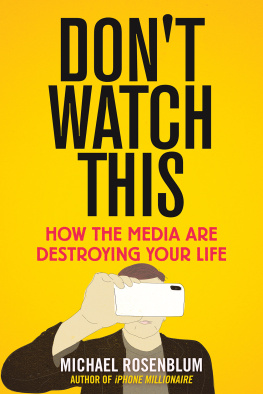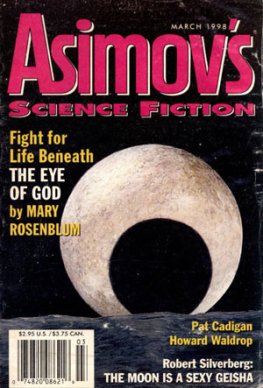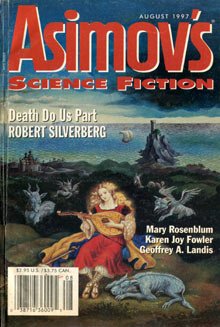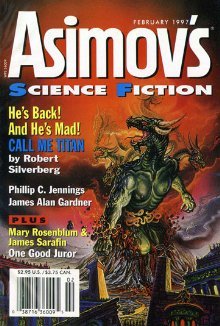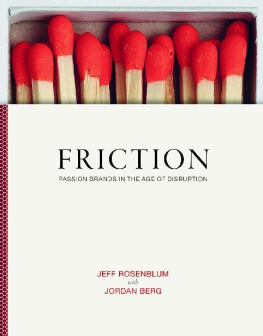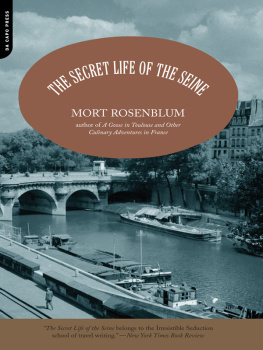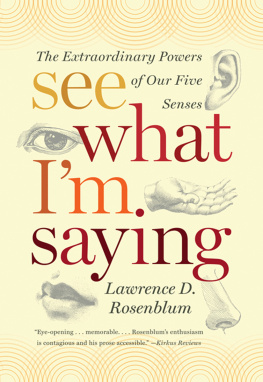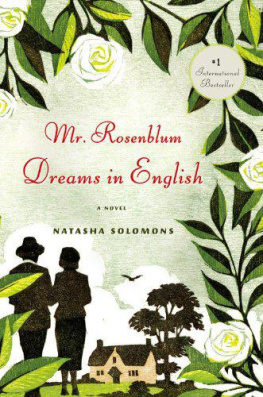Michael Rosenblum - Dont Watch This
Here you can read online Michael Rosenblum - Dont Watch This full text of the book (entire story) in english for free. Download pdf and epub, get meaning, cover and reviews about this ebook. year: 2020, publisher: Skyhorse, genre: Art. Description of the work, (preface) as well as reviews are available. Best literature library LitArk.com created for fans of good reading and offers a wide selection of genres:
Romance novel
Science fiction
Adventure
Detective
Science
History
Home and family
Prose
Art
Politics
Computer
Non-fiction
Religion
Business
Children
Humor
Choose a favorite category and find really read worthwhile books. Enjoy immersion in the world of imagination, feel the emotions of the characters or learn something new for yourself, make an fascinating discovery.
- Book:Dont Watch This
- Author:
- Publisher:Skyhorse
- Genre:
- Year:2020
- Rating:4 / 5
- Favourites:Add to favourites
- Your mark:
- 80
- 1
- 2
- 3
- 4
- 5
Dont Watch This: summary, description and annotation
We offer to read an annotation, description, summary or preface (depends on what the author of the book "Dont Watch This" wrote himself). If you haven't found the necessary information about the book — write in the comments, we will try to find it.
Dont Watch This — read online for free the complete book (whole text) full work
Below is the text of the book, divided by pages. System saving the place of the last page read, allows you to conveniently read the book "Dont Watch This" online for free, without having to search again every time where you left off. Put a bookmark, and you can go to the page where you finished reading at any time.
Font size:
Interval:
Bookmark:


Copyright 2020 by Michael Rosenblum
All rights reserved. No part of this book may be reproduced in any manner without the express written consent of the publisher, except in the case of brief excerpts in critical reviews or articles. All inquiries should be addressed to Skyhorse Publishing, 307 West 36th Street, 11th Floor, New York, NY 10018.
Skyhorse Publishing books may be purchased in bulk at special discounts for sales promotion, corporate gifts, fund-raising, or educational purposes. Special editions can also be created to specifications. For details, contact the Special Sales Department, Skyhorse Publishing, 307 West 36th Street, 11th Floor, New York, NY 10018 or .
Skyhorse and Skyhorse Publishing are registered trademarks of Skyhorse Publishing, Inc., a Delaware corporation.
Visit our website at www.skyhorsepublishing.com.
10 9 8 7 6 5 4 3 2 1
Library of Congress Cataloging-in-Publication Data is available on file.
Cover design by Brian Peterson
Print ISBN: 978-1-5107-5827-8
Ebook ISBN: 978-1-5107-5876-6
Printed in the United States of America.
To my lovely wife, Lisa, who not only saved my life both figuratively and literally but also gave me the support I needed to write this and tolerated my endless pounding on a manual keyboard. It can be quite noisy!
EVER FEEL LIKE YOURE LIVING IN A REALITY TV SHOW? ITS BECAUSE YOU ARE.
At the age of 50, I completely changed my life.
I was a recently divorced, very highly paid executive in the TV business. I lived in Midtown Manhattan in a large glass-and-steel building that towered over Rockefeller Center. My world was defined by meetings in other glass-and-steel towers, by limos and town cars, and by expensive restaurants and dinner parties in other apartments not all that different from mine, with people not all that different from me. I thought I was at the pinnacle of life, that things could not possibly be better. Who would want to live in any other way?
Then, shortly before my fiftieth birthday, I picked up BBC as a client, and I started to commute to Britain on a regular basis. And it was there, at the BBC, that I met Lisa Lambden. She was running the project that I was working on for the Beeb.
I went on to marry Lisa. We bought a small cottage in a little village in the English countryside, and that is where this story properly begins.
I have always been an early riser. Even if I go to bed at two in the morning, I am still up at five. I cant help it. My father was in the army, and he would come into my room every morning at five, turn on the lights, make the sounds of the bugle call of reveille, sans bugle, and then shout, Time to get up. Up, up, up! Out of the sack. Get those feet on the floor! And that is how I started every day from the age of five or six. Those early lessons live on, so to this day, my eyes pop open at five, and there is nothing I can do about it.
On one particular morning, I was wide awake at five, lying in bed, when I heard a peculiar noise just outside my windowa kind of gentle cooing, but quite loud and quite close.
It was a pigeon, a wood pigeon, and he was strutting back and forth on the peaked roof of our garden room, just below our bedroom window. He had a twig in his beak, and he seemed to be scoping out the neighborhood, perhaps for the local cat that always prowls the garden.
I watched in silence, as I might watch a Discovery or National Geographic nature show, and, after a rather interminable five or six minutesat least in the world of television where everything happens quite quicklythe pigeon, carefully looking both ways to make sure all was clear, plunged headlong into a tall hinoki cypress tree that stands just at the edge of the garden room.
A few minutes later, the bird emerged from the dense and nearly impenetrable center of the tree, paused on the garden-room roof, surveyed the surroundings, and took flight. A few more minutes later, the pigeon returned to the roof, another twig in beak, and again, after a suitable pause and examination of the surroundings, plunged yet again into the tree.
I was able to watch this show every morning, day after day, for several weeks. The bird was busy building a nest. Soon, I assumed, there would be a whole family of new wood pigeons in my garden.
The tenacity of the birds, their utter and unflinching dedication to the task of building a nest, first from twigs and later from bits of string or long grass that they found God only knows where, astonished me.
How do they know what to do? I wondered. Who taught them how to make a nest? A quick visit to the website for the RSPB, or the Royal Society for the Protection of Birds, a most British institution, quickly answered my question. It is instinct. It is in their genes. They not only make nests, they make nests that are unique to their species. Generation after generation, year after year, these birds would fly off somewhere, find a suitable place safe from cats and other predators, and build a nest identical to the one in which they had been born. It was their instinct that had allowed the species to survive. Without that, they would have vanished long ago.
The longer I watched, the more the question gnawed at me. How did they know? How did they know what twigs to gather, what grass to get? How did they know that spiders would not only feed their young but also provide sticky webs that would help hold their twigs and grass and string bits together like a kind of cement? Who told them that?
The answer, of course, is that no one told them a thing. No one had to teach them. They knew because of instinct. It is in their genes from the moment they are born.
Recently, we went to a small agricultural exhibition at Chatsworth, the massive stately home owned by the duke and duchess of Devonshire, but, as with most of these massive stately homes, opened to the paying public. Apparently dukedom does not pay the way it used to.
Walking the grounds of the agricultural exhibit, we came upon a donkey that had just given birth. The young foal was no more than a few hours old, and yet it was already up and walking and nosing at the hay on the ground in search of something to eat. A collection at the chicken house showed the same thing; young chicks, just hatched, were already busy pecking at the ground in search of food. Everywhere I looked, whether it was to birds or donkeys or horses or the innumerable sheep that live next to my cottage, or even insectsall living creatures seem to have an inherent and inborn instinct that tells them what to do.
My neighbor Tim is a beekeeper. Generation after generation of his bees continue to forage in the field, find their way to the sweetest nectar, and return to the hive to produce wax and honey and yet more bees. Their instincts provide them the knowledge they need for survival.
Conversely, take a human baby, just born; place it alone on the ground; and see what happens. The answer is, of course, nothing. Left alone, it will die.
We humans are an incredibly weak speciesfragile, delicate, and seemingly lacking in even the most basic instincts for survival that every other living thing seems to naturally possess. Why is that? How have we not only survived but also risen to dominate the planet and all other living things?
I am not the first person to ask these questions. They are as old as humanity. The ancient Greeks dealt with these very questions, in their own way, nearly three thousand years ago. In the the eighth century BCE, the Greek poet Hesiod tells the story of Prometheus to help explain this dilemma.
Next pageFont size:
Interval:
Bookmark:
Similar books «Dont Watch This»
Look at similar books to Dont Watch This. We have selected literature similar in name and meaning in the hope of providing readers with more options to find new, interesting, not yet read works.
Discussion, reviews of the book Dont Watch This and just readers' own opinions. Leave your comments, write what you think about the work, its meaning or the main characters. Specify what exactly you liked and what you didn't like, and why you think so.

